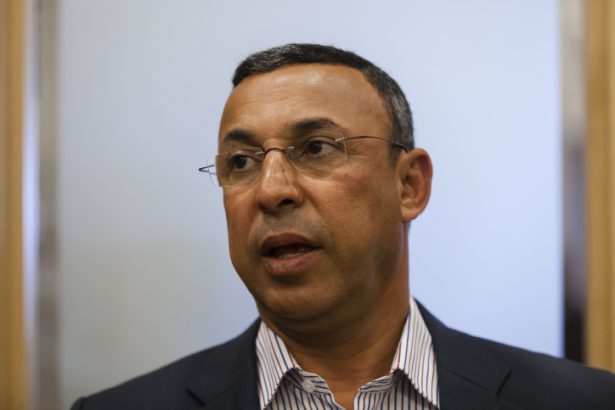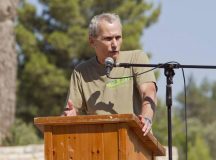Ashraf al-Ajrami was the Minister of Prisoners Affairs for the Palestinian Authority (PA) between 2007 and 2009. A former Director of Israeli Affairs at the PA Information Ministry, he is now a journalist at the Al-Ayah newspaper and a writer for Antares, A’Disarat and Alfilestinia magazines. Born in Jabaliya and now a resident of Ramallah, he spent 12 years in Israeli prisons from 1984 to 1996. He spoke to Fathom Editor Alan Johnson on 7 March 2016.
Part 1: Prisoners
Alan Johnson: Let’s begin by talking about the Palestinian prisoners. The political significance of this issue is perhaps not always understood in the West. Could you tell us how this issue is seen from a Palestinian perspective and how you addressed it when you were Minister for Prisoner Affairs for the PA from 2007-2009?
Ashraf al-Ajrami: It is very important because the Palestinian people see the prisoners as fighters for freedom; for the land, and for the people. The support isn’t related to what they did. The Palestinian leadership does not accept some kinds of actions, especially attacks on civilians. But, if you see this issue historically, and as a whole, you can also see the people who conducted such attacks as victims of the occupation. What motivates people to commit such acts, and to endanger their own lives, as they are in the present wave of stabbings? It is because of the whole situation: the occupation, the conditions, and the need to struggle against the occupation. It’s very complicated, which is why the PA created a special ministry to handle this issue. As the minister responsible, I tried to have an open line to my Israeli counterpart, Minister Avi Dichter in the Olmert government. We tried to improve the conditions of the Palestinian prisoners in Israeli jails. We created some kind of stability in the jails, especially between the Palestinian prisoners and the administration there. That meant prisoners’ rights – to space, food, health care and so on.
As Minister I had three main duties. First, to improve the conditions of the prisoners in Israeli jails. Second, I was responsible for their rehabilitation and reintegration after release. We gave assistance, education and training so they could reintegrate into society. And to some of those who served a long period in jail, we gave jobs in the PA. Third, to organise support for the prisoners families. When a prisoner has a long sentence, you must support his family and ensure his children are looked after and can have as normal a life as possible.
Part 2: Peace
Alan Johnson: Why did the John Kerry-led peace talks fail in 2013-14?
Ashraf al-Ajrami: The Americans made a big mistake. They invited the two leaderships to talk without preparing the ground, so it was not fruitful. There was not even a basic understanding about the goal of the negotiations. The Americans told the Palestinian leadership that the negotiations were being held on the basis of the 1967 borders, so we wanted to start negotiating that issue at the first stage – seek agreement about borders before moving into the other core issues: refugees, Jerusalem, water and so on. At the same time, the Americans told the Israelis that they could raise what they wanted. They did not keep strictly to the terms of reference.
We have negotiated with the Israelis for 20 years without any result, because there has not been agreement about the terms of reference. Only in the period of the Olmert government was there any kind of understanding between the two sides, though it was not written down, that negotiations were to be based on the 1967 borders. We started this peace process from the Madrid Conference, and carried on through Oslo, with the participation of the Americans, on the basis of the Road Map, the Arab Peace Initiative (API), and the Security Council Resolutions 242 and 338. The Israelis didn’t accept these terms of reference. The Americans didn’t think that there had to be an understanding about terms of reference. John Kerry thought that if he spent hundreds of hours negotiating with the parties he could achieve a breakthrough, but unfortunately he did not succeed.
The problem is not just that he did not succeed: there was huge frustration and disappointment – the hopes raised were now dashed. This brought something very bad to the atmosphere in both Israel and Palestine.
Alan Johnson: You mention the API. You think of it as an opportunity that Israel has missed: why?
Ashraf al-Ajrami: The API gives the Israelis what they dreamed of. At the Khartoum Summit of the Arab League in 1967, the Arabs said ‘No, No. No’: No negotiations, no recognition, no peace or reconciliation. The API says, ‘Yes, Yes, Yes’. Everything the Israelis dreamed about achieving in its relationship with its neighbours, the API gives it. Unfortunately, the Israelis didn’t react. They did not respond positively or negatively; they just didn’t react, even though the API gives the Israelis a veto on the refugee issue, by calling for a ‘just and agreed’ solution.
Even when the Arab League amended the API in 2013 to accept the principle of land swaps the Israelis did not respond! The API speaks about normalisation, cooperation, and security. And the Islamic League also backs the API! But still Israel does not respond.
What do they want? Here is an opportunity which gives Israel everything and they don’t respond! If I was an Israeli leader I would agree to the API, even if I have some amendments. I would agree, and then talk about the details.
Alan Johnson: In 2014 at the Herzliya conference you said that ‘Israel is advancing towards a bi-national state’. My question: do you think it is doing so with its eyes open, walking forwards, or is it a colossal act of carelessness?
Ashraf al-Ajrami: I don’t think they plan to have a bi-national state. But the current Israeli leadership and the right-wing parties don’t want to go down in history as the people who gave up on Eretz Israel, Greater Israel. They want to keep control of all the land – this is the important thing for them. They don’t think beyond the current management of the conflict. I don’t think they want the one-state solution; they just want to prevent any giving up of land. This is very dangerous because the settlers would like to have one million Jews living in the West Bank. No government could evacuate so many people, or even half that number. The settlements are spreading and you can’t have a viable contiguous Palestinian state if it is a set of isolated islands. If the Israelis continue building and expanding settlements there will be no Palestinian state.
Part 3: The Palestinian National Movement
Alan Johnson: Your life has been spent in the Palestinian national movement. Could you speak about the current Palestinian strategy to achieve statehood?
Ashraf al-Ajrami: The strategy is to go to the international community and to obtain as much recognition as possible for a Palestinian state on the 1967 borders. We want to establish this fact. We are negotiating with the Israelis – a very strong state – but we have no state and have no strong cards to play: so it’s unequal. It’s not a process of mutual giving and taking. The Palestinian leadership thinks that if we are recognised as a state under occupation – on the 1967 borders – we can sit with the Israelis as two states, even if one is under occupation. It gives us strong cards to negotiate with and some kind of equality. We won’t equal the power of Israel, but at least with the support of the international community we can negotiate some kind of two-state solution. If the Israelis do not want to negotiate, then the international community can move ahead and impose some kind of solution on both sides. There can be a UN Security Council resolution, and the party which refuses this resolution can be put under some kind of sanctions by the international community. We can’t reach that point in one or two years. But in the long run we can, step by step. For example, we think the European Union took a very important step when it distinguished between the occupied territories and Israel. We think that if we can make the Green Line a ‘red line’ for the Israelis, it will be very helpful in creating a two-state solution.
Alan Johnson: One of the weaknesses of the Palestinian movement is the division between Fatah and Hamas, the West Bank and the Gaza Strip. Should there be reconciliation? If so, what are the prospects for reconciliation in the near future?
Ashraf al-Ajrami: It’s a very complicated issue for Palestinian society. We face the vision of the Islamic movement: they want an Islamic state and they will not give up this vision. On the other hand, there are members of Fatah who do not want to share power with Hamas. Fatah realises that if Hamas engages in the political regime then it must be at the same level as Fatah, as the two movements got roughly the same number of votes at the last elections.
Yet, when it comes to the peace process, reconciliation is vital so that the Palestinians can prove themselves to be a negotiating partner. Reconciliation can also push the international community into a stronger intervention. The Israelis use the division as an excuse not to withdraw from the West Bank. They say, ‘if we withdraw, we may see Hamas taking over the West Bank and using it to attack the Israeli cities and airport.’ But, the only basis for security – real security – is an agreement with the other side. And the other side must be satisfied and have an interest to keep the agreement. I don’t think that if we have an independent state the Palestinian people will put it at risk. I think the Israelis use the division as an excuse not to move ahead in the negotiations, so we must act in a way which gives the Israelis no excuses not to reach an agreement.
Alan Johnson: My final question concerns the so-called stabbing intifada. There are two narratives about this intifada. One tells a story about Palestinian incitement as the cause. The other tells a story about occupation, hopelessness, desperation and anger. How do you explain the current wave of violence?
Ashraf al-Ajrami: I don’t think the problem is official incitement. Young Palestinians don’t really watch the official Palestinian media. They are engaged in social networks. They do not listen to the calls of the various Palestinian factions. They have lost confidence in all kinds of leadership. This is because of the failure of the peace process: the situation is frozen; there is no movement in any direction.
There has been Israeli provocation, too.
While Israelis say there is no policy to change the status quo of the Al-Aqsa Mosque, put yourself in the shoes of the Palestinian people: when they see, for example, Israeli Minister Uri Ariel with a group of extremist settlers, going to the Al-Aqsa Mosque, with media, and making clear that they want to demolish the Al-Aqsa Mosque and build the third temple in its place, well, this is a minister – a government official – not a man from a small unrepresentative group. Every two or three days there were incidents with extremist groups or MKs from the government. The Palestinians saw a real danger to the Al-Aqsa Mosque. Also, it was a mistake of Israel to prevent Palestinians from praying at certain times – this seems like a change in the reality, a change in the status quo, and people feared what was comings next and whether it was all leading to a Third Temple.
Second, you must look to the actions of the extremist settlers in the West Bank. They want to drive the Palestinians out of places that they seek to expand into. They attack villagers, especially during the olive season. Recently there was the terrible murder of the Palestinian family in Duma by settlers who threw a petrol bomb into their house. The father, mother, and one son died. The other son, Ahmad, survives; but you can imagine how he suffers with no family and a burnt body.
All this has a huge impact on young people. They can see no hope, no change, and they decided to change the situation even if they give their lives as a price. They don’t want to die. They want to change something. We can’t just explain it by one word: incitement. It’s a complicated problem with no easy answers. What motivates young people to wake up, take a knife and stab the first Jewish person they see? It’s not so simple. It’s difficult to get into their mind, but we must try. I think it is the entire situation which leads them to make such a decision.




































